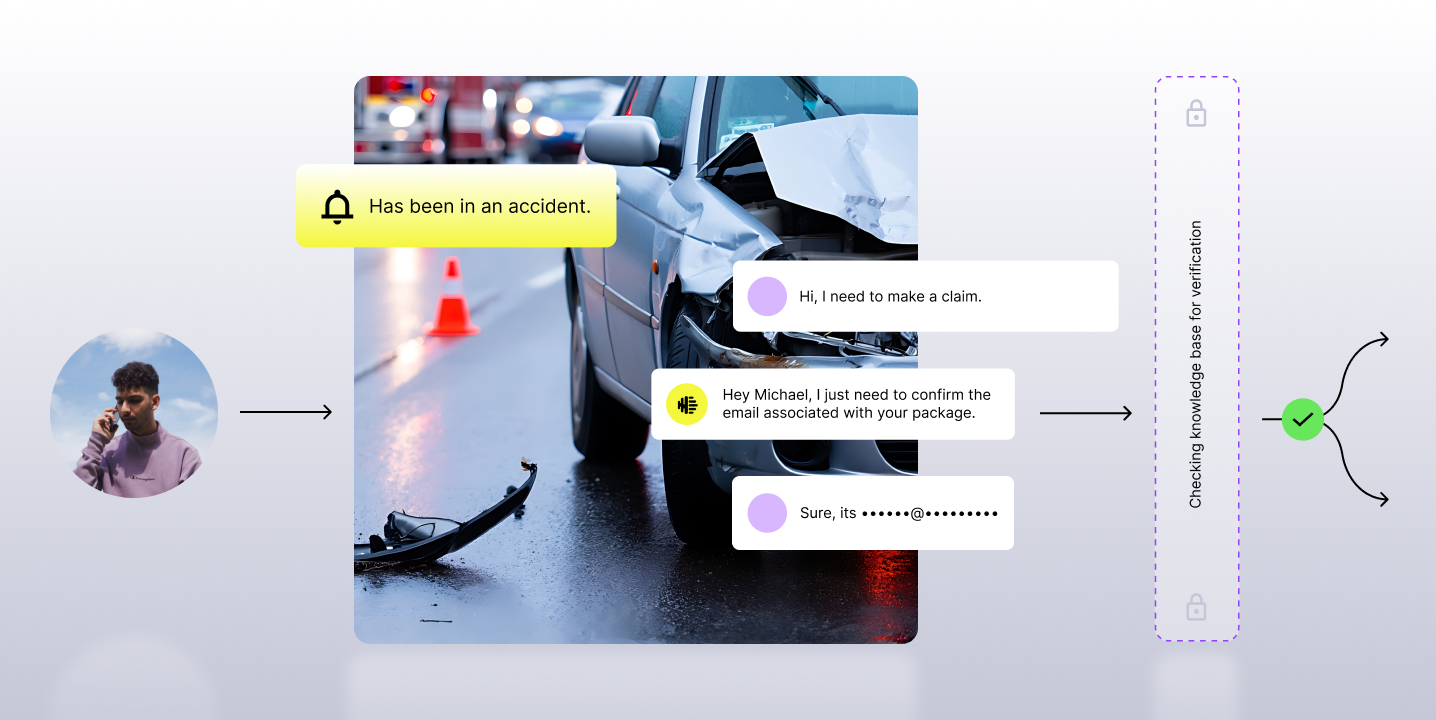What are soft skills for contact center agents?
Despite rapid growth across a number of customer service channels - live chat, chatbots, email, and social media being the most prominent - phone still is the most used (48%) and most preferred (80%) method for resolving queries. That’s because at the end of the day, if you want to get help, you call in.
While hard skills, things like technical proficiency and product knowledge for example, vary from industry to industry, soft skills are universal across all industries. At the end of the day, providing a quality CX is about establishing and building a relationship with the caller.

What are the most critical soft skills in a contact center?

- Empathy: the agent’s ability to understand the feelings of the caller and recognize their point of view.
- Problem-solving skills: the agent’s ability to think critically and find answers to complex queries, and more skillfully resolve the caller’s issue.
- Positivity: hand in hand with empathy, an agent should approach every conversation with positive intent. In addition to providing a positive experience for callers, this also contributes to a better workplace culture among other agents and managers.
- Collaboration: with coaching programs becoming smaller and more targeted, small group, peer, and 1:1 training sessions rely on a collaborative mindset to yield more impactful results.
- Adaptability: the more complex the industry or product, the more complex the queries the agent will receive. In an ever-evolving world, agents must be able to adapt to frequent changes, whether it be coaching programs, new compliance legislation, or environmental changes out of their control (like the rapid shift to remote work as a result of COVID-19).
- Patience: agents are often tasked with handling calls from frustrated or confused callers. Patience is key for an agent to take the time to understand the caller’s needs and help them solve their query.
- Active listening: There’s a difference between hearing the caller and truly listening to the caller. Active listening is the key to understanding the caller query and more effectively resolving the issue.
Benefits of coaching agents on soft skills. It’s all about the KPIs.
Soft skills directly impact the most mission-critical call center KPIs across an organization. Whether you’re trying to improve customer experience, make your agents more efficient in their day-to-day, or mitigate compliance risk, agent soft skills are a powerful way to achieve your KPIs.
We’ll first start with the benefits, then in our next section, we’ll walk through a couple ways to coach agents to improve their soft skills.
Agent empathy = a better CX
When agents approach a conversation with empathy, they’re acknowledging the caller’s thoughts and feelings. They’re connecting by putting themselves in the caller’s shoes which in turn shows the caller that they truly care. And as a result, when an agent uses empathy statements throughout a call, the caller finishes the conversation with a more positive customer experience.
Problem-solving skills = higher FCR rate
First call resolution (FCR) is the rate in which an agent resolves the caller’s issue on the first attempt. The better the agent’s problem-solving skills, whether it be applying prior coaching, efficiently navigating their internal knowledge base (IKB), or having deeper domain knowledge, the better their rate of first call resolution.
Positivity = better sentiment
Sentiment analysis was traditionally black and white. Was the call overall positive or negative? With tonality-based sentiment analysis, you can understand the myriad of caller emotions beyond what was said, to how it was said. This incorporates tone, intent, silence, and volume, and maps it to specific interactions across the call. When an agent approaches the call with positive intent (and empathy), they’re influencing that call to stay positive. The result is higher sentiment scores from start to end.
Active listening = lower average handle time
Active listening is key to understanding the root of the issue on every call and the details required to more quickly and seamlessly resolve the issue. That’ll directly correlate with average handle time (AHT), because the agent is more effective in handling their calls. Active listening is at the core of applying other coachable techniques, like empathy statements and product/industry knowledge, but it all begins with understanding what the caller truly needs.
Adaptability = lower supervisor escalation rate
It’s estimated that 85% of escalations could have been resolved with the initial agent. However, supervisor escalations are a common fallback for frustrated callers, and any number of causes drive them, from lack of agent confidence to the complexity of the query. The agents’ ability to adapt to a variety of situations is a key soft skill for de-escalating a situation, whether it be laying out multiple options, using empathy statements, or utilizing tools and permissions available to them.
Coachability = mitigate compliance risk
Specifically for highly regulated industries like insurance, healthcare, and collections, an agent’s coachability to understand and adhere to compliance guidelines is crucial to the business. A single violation can lead to stiff penalties or even a ban on operating. Having agents who understand when to follow complex compliance processes begins with their ability to be coached.
How to coach to improve agent soft skills
With an understanding of the most important call center agent soft skills and the impact they can have on your organization, let’s next look at a couple ways you can coach agents on them.
Keep in mind, to effectively create coaching programs around soft skills, you need comprehensive insights on every interaction taking place on the call, as well as a way to deliver contextual, data-backed feedback to the agents. That’s where contact center AI comes into play. You can read more about the infrastructure behind coaching for soft skills here.
Coaching on empathy statements to drive well...agent empathy
The most impactful way to increase agent empathy is to coach agents on how to utilize empathy statements throughout a call. One of our customers, a large U.S.-based moving company, monitors their agent performance around empathy statements using a MAGIC and Tragic moments methodology.
MAGIC moments are interactions that “Make A Great Impression on the Customer,” for example, “I understand your frustration” or “we’ll get this fixed for you.” On the other hand, Tragic moments do the opposite, delivering a negative experience for the caller and creating a sense of uncertainty, frustration, or doubt.
Another one of our customers, a national window coverings provider, coached agents on using empathy related statements, and saw an immediate improvement in empathy scores from 11% to 37%.

Here’s a simple process for coaching on empathy:
- Analyze: Monitor calls for areas of negative sentiment.
- Analyze: Identify the root cause of the negative sentiment. Was it a word or phrase the agent used?
- Analyze: Knowing the root causes, you can then monitor trends in how often specific root causes drive negative sentiment.
- Evaluate and Coach: Citing specific moments on a call, your supervisors are able to coach agents on how to use empathy statements when certain interactions take place.
- Coach: Monitor an agent’s empathy scores overtime to track both personal growth, as well as coaching program effectiveness.
Use variations of collaborative coaching sessions
Collaboration is a valuable soft skill that encourages agents to work together and with their supervisors to improve their own, and their peers’ performance across a number of KPIs.

1:1, group, and peer-to-peer coaching sessions are three great options. Peer-to-peer sessions, sometimes called peer calibration, in particular are powerful in that it gives agents a safe and collaborative environment to collaborate - in many cases, making it easy for agents to openly share issues and work together to improve them.
Some other best practices to encourage collaboration include:
- More frequent check-ins from supervisors to see how agents are improving. It’s important that supervisors sandwich negative feedback with positive feedback.
- Informal break-out discussions to apply new information with peers.
- Shadowing of more seasoned agents.
- Targeted micro-coaching sessions for seasoned agents.
Use QA evaluations to coach on active listening and patience
This is where coaching with context comes into play. By using specific call snippets or in-transcript comments in every QA evaluation, agents can look at not only what they need to improve, but understand why they need to as well.
This is particularly important when it comes to coaching on active listening and patience, which go hand in hand. When an agent is able to review their own call and look at what the caller was saying, understanding their true intent, supervisors can more effectively coach them on how actively listening could have better resolved the call.

Like Tammi Zelm, VP of CX at ASSA ABLOY said on our recent webinar on 3 Proven Ideas to Improve CX quality:
“It’s so much clearer for agents when they can hear themselves. They make the connection as to how they are sounding. They consistently have aha! Moments. They think: ‘I need to change the way I’m deflecting and practice that.’ Now the agent can monitor her progress. Using data and examples, it’s less personal, more impactful.”
Wrapping Up
From hiring new agents to developing them, soft skills should be at the forefront of your coaching strategy. Though they can be hard to pinpoint in every agent, utilizing speech analytics and contact center AI allows you to monitor the interactions and KPIs connected to each essential soft skill.
All in all, they’ll give you the baseline for coaching your agents on the human side of the call center - connecting with callers, empathizing with them, and delivering a great customer experience 100% of the time.

















